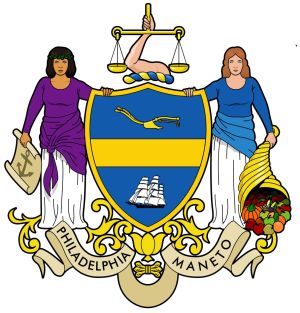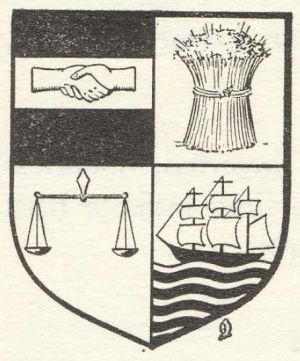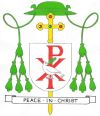Philadelphia: Difference between revisions
Knorrepoes (talk | contribs) m (Text replacement - "{{us}}↵↵''' {{uc:{{PAGENAME}}}} '''" to "''' {{uc:{{PAGENAME}}}} '''") Tags: Mobile edit Mobile web edit |
Knorrepoes (talk | contribs) m (Text replacement - "{{media1}}" to "{{media}}") |
||
| Line 23: | Line 23: | ||
{{us}} | {{us}} | ||
{{ | {{media}} | ||
Latest revision as of 08:50, 2 August 2023
PHILADELPHIA
State : Pennsylvania
Blazon
Azure a fess or between a plow in chief and a ship under full sail in base proper.
Crest: A right arm, nude, embowed, couped at the shoulder holding a pair of scales.
Supporters: Dexter, a female figure standing full face, habited white and purple, crowned with an olive wreath, and in her right hand an open scroll charged with an anchor; sinister, a similar female figure, habited white and blue, in her left hand a cornucopia.
Motto: Philadelphia maneto
Origin/meaning
Unfortunately we have no information on the meaning or origin of these arms yet.
If you have any information on the origin or meaning of these arms, or have additional images that you want to share, please mail us your information !
In the eighteenth century Philadelphia used the arms below:
The tinctures are uncertain and the hatching used in documents may merely have been shading. On a print of 1762 the lines show the fields as follows: (1) azure, (2) vert, (3) argent and (4) gules.
The ship was carried over into the new coat of arms and the device of the scales in the old arms became the crest in the new ones.
US heraldry portal
This page is part of the US heraldry portal |
Heraldry of the World |
|
US heraldry:
|
Ecclesiastical Heraldry of the USA:
Military Heraldry: |
Contact and Support
Partners:
Your logo here ?
Contact us
© since 1995, Heraldry of the World, Ralf Hartemink 
Index of the site
Literature : Chapin, 1935
















